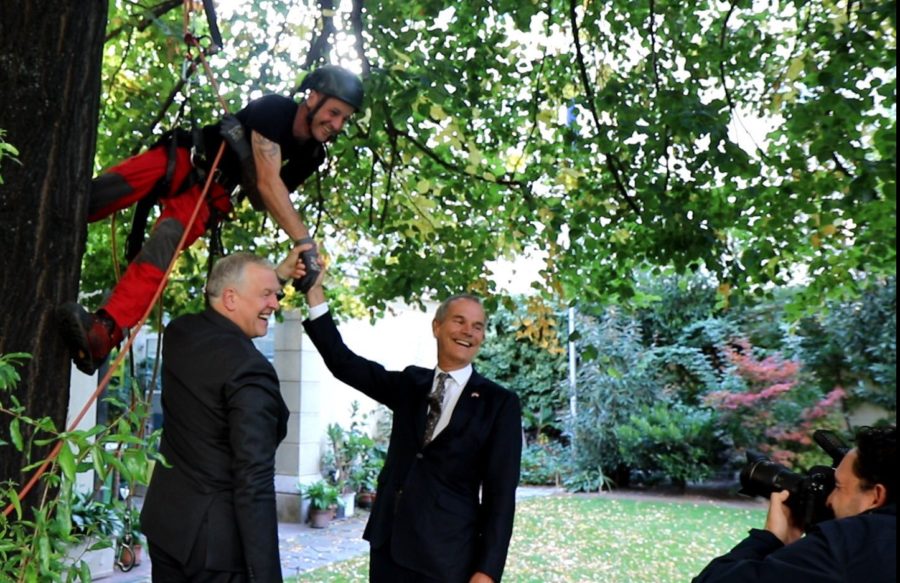Have you ever wondered why the trees are painted white in Vienna? To stop cars running into them, protect them from dogs? The special paint protects new bark from the summer sun! Woodland trees don’t require sun cream but the intense environments of our cities means it’s not only humans who need protection from harmful rays.
I recently had a wonderful opportunity to meet Austria-based British Tree Surgeon Martin Speariett, whilst he was dangling precariously from a Robinia tree he had been pruning in the Embassy’s garden. He said that increasing the amount of ‘green coverage’ in cities helped regulate temperature and reduce air pollution. More trees meant cleaner air but, in man-made environments, we were responsible for keeping the trees healthy too. I asked whether he had noticed any impact from the hotter summers on city trees. He said that trees did indeed suffer from heat stress and lack of water. The negative impact hotter summers are having on trees and plants is another indication of the toll global warming is taking on our environment.
Increasing forest cover and managing the health of our trees and plants is one way we can improve our environment and help tackle climate change.
Forest management is one part of the UK’s 25 year Environment Plan. Under the Plan the UK has published the Tree Health Resilience Strategy, setting out how to reduce threats, and strengthen the resilience of, trees, woodlands and forests. The UK has also appointed Sir William Worsley as Tree Champion to promote woodland creation. Sir William oversees the National Forest Company, which has transformed 200 square miles of industrial land in the heart of England and now attracts over eight million visitors a year. This in turn helps wildlife like otters, water voles and dragonflies to flourish.
Meanwhile, the Woodland Trust has called for 1 million people and businesses across the UK to pledge to plant a tree on their land, or inform local councils of areas for potential tree planting.
The General Assembly of the United Nations has declared 2020 as the International Year of Plant Health (IYPH) and the UK will be supporting this to raise awareness on how protecting plant health can help end hunger, reduce poverty, protect the environment, and boost economic development. Look out for UK and international activities which will run throughout the year, and National Plant Health week in spring.
We are lucky to have several mature trees within the Embassy grounds, and recently had the embassy garden replanted to provide space for the younger trees to grow and revitalise the bedding plants. Not only is this doing its bit for the environment, but it also benefits all of us working in the embassy, providing a healthy space to meet or take a breath.
My Robinia tree is looking healthier after its ‘haircut’. It was planted in the 1930’s and has lived through many changes, I hope it will stay around to see a lot more.
Ambassador to Austria and UK Permanent Representative to the United Nations and other International Organisations in Vienna
Part of UK in Austria
25th October 2019 Vienna, Austria








